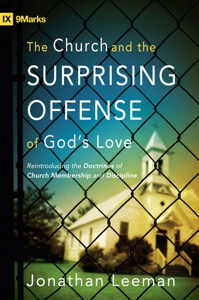Jonathan Leeman’s The Church and the Surprising Offense of God’s Love, reviewed by Timothy Lim Teck Ngern
Editor’s Note: This is the full review of Jonathan Leeman, The Church and the Surprising Offense of God’s Love. For the Review in Brief, see the full Fall 2012 issue of Pneuma Review.
 Jonathan Leeman, The Church and the Surprising Offense of God’s Love: Reintroducing the Doctrines of Church Membership and Discipline, 9-Marks Building Healthy Churches Series (Wheaton, Illinois: Crossway, 2010), 375 pages, ISBN 9781433509056.
Jonathan Leeman, The Church and the Surprising Offense of God’s Love: Reintroducing the Doctrines of Church Membership and Discipline, 9-Marks Building Healthy Churches Series (Wheaton, Illinois: Crossway, 2010), 375 pages, ISBN 9781433509056.
When was the last time you read a significant discussion on church membership, discipline and excommunication? Jonathan Leeman’s contribution stands out for three reasons: first, he rethinks the case for church membership grounded in the nature, rule, charter, and covenant of God’s love and not the concept of love as conceived by contemporary Western culture. A critique of the churches’ subtle acceptance of popular conceptions of love is in order, and in that sense, Leeman’s work surpasses significant contributions such as by Clark, Dulles, Lawless, and White-Duesing-Yarnell.[1] Second, Leeman bridges theoria and praxis, speaking as an elder in a Baptist Church (Washington, D.C.) and a PhD candidate (University of Wales). In this volume, his greatest contribution lies in the practical ramifications to his proposal in Part 3: “Loved Lived.” Excommunication—which is a form of church discipline made public—is necessary to preserve God’s glory and for the church to reconsider whether it is able to affirm the individual’s faith, only in areas of formal sins of unrepentance that are serious in nature (though he excludes those who renounce the faith from this list). Church officials enforcing discipline should not exercise coercion (a sign of the workings of the flesh) but they should rather appeal to the gospel and depend on the Spirit (since all humans are utterly helpless and unable to repent and submit apart from the Spirit of grace). Third, he correctly views his own project as an attempt to support British theologian John Webster’s claim in a footnote that ecclesiology (the doctrine of the church) is only as strong as its membership, whose identity and shape must be built on the doctrine of God.
In a nutshell, Leeman argues that local church membership and discipline (implied, excommunications when necessary) understood biblically is the best structure for the corporate life of the church in her witness to the gospel. Believers who fail to submit to biblical injunction for church membership raise questions about their authenticity in the faith. He further postulates that those who are offended by church membership merely reflects their own offense at God’s love; this is because, the prevailing culture’s idolatrous understanding of love will pull in the direction opposite of the church’s understanding of the exclusionary nature of God’s love. Leeman draws the analogies from sources such as Hawthorne’s Scarlet Letter to demonstrate the difference between the pursuit of unsanctioned and adulterous love and the love instilled by the church’s holy discipline. Contemporary understandings of love as freedom from strictures (i.e., boundaries, institutional/moral judgments, and authorities) contravene Christian civilization, doctrines, and ecclesiological structures.
The contemporary church has succumbed to the “realities of enculturation in the churches” (p.41) when it follows contemporary culture to keep boundary-markers out of the churches, charges Leeman. When love becomes self-expression and self-fulfillment, “the gospel … becomes refashioned for therapeutic purposes” (p.49). Consequently, churches become objects for satisfying humanity’s unquenchable desires (p.50); the commitment expected of love is replaced by the notion that “ask little of others and gives little in return” (p.56). When moral absolutes that accompany true love are rejected, skepticism’s motivation of “love as anything goes or whatever works for you/us” becomes the new mantle for how churches relate with church members and newcomers. Ultimately, this hatred for authority of the church and the premium placed on communal individuality rests on a diminished concept of God (p.63).


